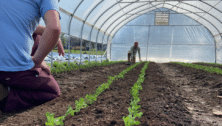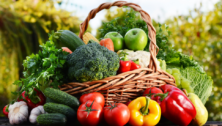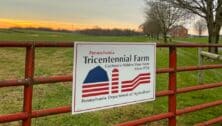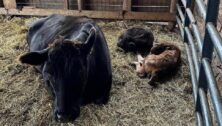Dairy Farming in Chester County: Fewer Farms, More Cows
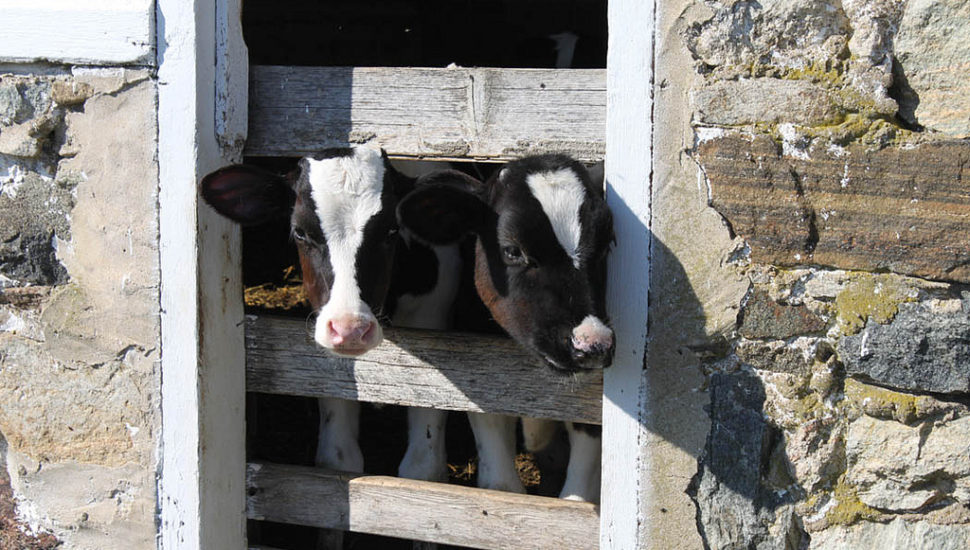
By Duncan Allison
Dairy farming and dairy products have long been associated with Chester County since there was strong demand from Philadelphia and the expanding suburbs. In the days before trains and trucks our proximity to this large and expanding population gave us a strong advantage over Lancaster County.
In 1940 there were 4.7 million dairy farms in the US with an average of 5 cows but by 2012 there were only 64,098 dairy farms with 49% of farms with more than 1,000 cows.
Here in Chester County there were almost 3,000 dairy farms in 1940 and this number had been reduced to 275 by 2012, varying in size from 30-50 dairy cows with several over 700.
Today the dairy farmer is operating in a changing and very challenging market with no control of the milk price which is set by the federal government using complex formulas that weigh supply and demand.
Not surprisingly fluid milk has the highest value as the other dairy products require processing steps and receive a lower price in the four class payment structure.
Our Northeast market has focused on fluid milk since our region is 2.5 times as densely populated as the second-most dense region, the South.
However fluid milk consumption has been declining while sales of ice cream, cheese and yogurt have been increasing and there has even been a recent increase in the use of butter, perhaps somewhat due to McDonalds turning back to butter!
Dairy farmers in Pennsylvania have been very successful at increasing milk productivity and there have been five straight years of increasing production from 2011 to 2015 but farm prices have varied in Pennsylvania from $27.40/cwt in September 2014 to $17.60/cwt in August 2015.
How do dairy farmers cope with this significant price differential?
The answer is with difficulty as maximizing milk production is one of the few options. Feed represents 40-50% of production cost and luckily our climate is ideally suited to the production of feed and forage crops.
Milk yields have to be closely monitored so careful breeding is aimed at producing high yielding cows with good feed conversion ratios. There is little opportunity to reduce other costs such as labor, taxes and veterinarian charges which are largely fixed.
Virtually all dairy farms make use of artificial insemination (AI) as dairy bulls are notoriously difficult (and dangerous!) to manage and AI allows access to the best possible genetics.
Breeding and management have enabled dairy farmers to produce 59% more milk with 64% fewer cows, consuming 77% less feed and 65% less water per hundredweight of milk compared to 1944.
In addition to the challenge of monthly price changes dairy farming is a demanding business as cows must be milked twice every day of the year – you cannot turn off the tap! Family labor usually has this task on smaller farms but a year round supply of reliable and diligent workers is very important.
Milk standards are high so hygiene is vital and the disposal of manure is also highly regulated, particularly for large dairies – over 700 cows.
Chester County dairy farms have been finding several different ways to diversify their income source. Plain Sect dairy farms with 30-60 cows often supplement their milk sales income by growing produce during the summer and selling direct at farms stalls or through the Oxford Produce Auction.
Several Chester County dairy farms have been very successful at producing high value artisan cheese. Examples include Sue Miller at Birchrun Hills Farm, Chester Springs, with her award winning cheese and the Rotelle family at September Farm, Honey Brook also won awards at the 2016 PA Farm Show for their flavored cheeses.
Seven Stars Farm, Phoenixville has focused for the last 25 years on producing high quality organic yogurt from their Jersey cattle which is sold through many outlets nationally. Baily’s Farm in Pocopson installed bottling equipment so they supply bottled milk locally.

Walt Moore and Dwayne Hershey each has over 700 dairy cows and decided to purchase their own tankers to deliver their bulk milk to the bottlers or processors. Most dairy farmers belong to one of the big coops such as Dairy Farmers of America and Land O’Lakes who have tankers that have to transport milk every single day of the year.
Climatic conditions and the availability of a large market should enable our dairy farms to survive in future years.
Milk is one of the most nutritious foods and we are unlikely to give up on our love of cheese, yogurt and ice cream. Give a thought for the challenging life of our dairy farmers and search out some of our local artisan cheese makers.
Connect With Your Community
Subscribe to stay informed!
"*" indicates required fields
















![95000-1023_ACJ_BannerAd[1]](https://vista.today/wp-content/uploads/2023/03/95000-1023_ACJ_BannerAd1.jpg)




























